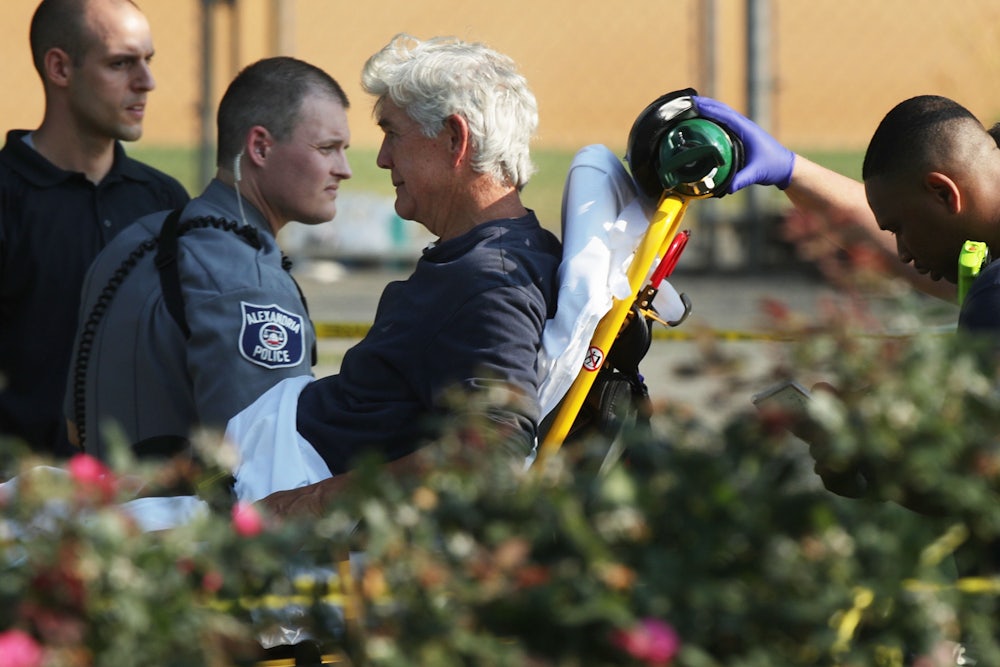The shooting of U.S. Representative Steve Scalise and four others early Wednesday in Alexandria, Virginia, is a reminder of how paralyzed the gun debate has become in America. After all, if anything could change the minds of legislators who oppose gun control, it would be their becoming the target of gun violence. But, as with the 2011 shooting of Representative Gabby Gifford in Tuscon, Arizona, the immediate response has been for lawmakers to reiterate their political positions on the issue.
Mo Brooks, a congressman from Alabama, was at the baseball practice targeted by James T. Hodgkinson, the 66-year-old suspect who died after a shootout with police. Asked if the incident had changed his position on gun control, Brooks replied, “Not with respect to the Second Amendment. The Second Amendment right to bear arms is to ensure that we always have a republic. And as with any constitutional provision in the Bill of Rights, there are adverse aspects to each of those rights that we enjoy as people. And what we just saw here is one of the bad side effects of someone not exercising those rights properly.” Senator Lindsey Graham had a similar response:
“It’s just a crazy world.” @LindseyGrahamSC reflects on today’s shooting, lawmakers’ safety and America’s gun laws. pic.twitter.com/eNARPWW5Rg
— Sahil Kapur (@sahilkapur) June 14, 2017
Brooks and Graham’s complacency is disheartening. Mass shootings are a widely acknowledged problem in America. Some of these shootings, as in the Islamic State–inspired massacres in San Bernardino, California, and Orlando, Florida, are classified as terrorism. Others, like the 2015 shooting of a Planned Parenthood clinic in Colorado which left three dead, are described by law enforcement as the work of “lone wolf” murderers.
These crimes are not united by ideology, as the apparent political sympathies and motivations differ. Hodgkinson, the Virginia gunman, was a Bernie Sanders supporter who volunteered on the senator’s presidential campaign last year. But Hodgkinson easily could have been a white supremacist like Dylann Roof, who killed nine people in the Charleston church shooting, or influenced by ISIS, like Orlando’s Omar Mateen and San Bernardino’s Syed Rizwan Farook and Tashfeen Malik.
What unites these shooters is their history of personality problems. Graham referred to Hodgkinson as a “nut job,” but as yet, we don’t know yet whether he was mentally ill. We do know, however, that he had a history of domestic violence, which fits a pattern with previous mass shooters. The Daily Beast reports:
Hodgkinson had a history of violence. In 2006, he was arrested for domestic battery and discharge of a firearm after he punched a man’s girlfriend “in the face with a closed fist,” according to a police report reviewed by The Daily Beast. When the man walked outside of the residence, Hodgkinson aimed a shotgun at him and later fired one round.
Hodgkinson was also “observed throwing” an unidentified minor “around the bedroom,” the police report said. Police identified the girl as his daughter. After the girl broke free, Hodgkinson followed and “started hitting her arms, pulling her hair, and started grabbing her off the bed.”
When Hodgkinson’s girlfriend tried to leave in a vehicle, he reached inside and “turned off the ignition,” the report said. “James then pulled out a possible pocket knife and cut [her] seatbelt.”
As Lois Beckett argued in the Guardian earlier this year, “In one mass shooting after another, some gun control advocates and journalists see a common thread: when domestic violence is not the immediate cause of a mass shooting, it was there as a warning sign in the history of the perpetrator.” New York magazine’s Rebecca Traister, writing last year after the cargo-truck attack in Nice, France, argued that if Republicans “are truly looking to stem terrorism and mass violence of the sort that happened in Nice, they might do better to look to a different kind of litmus test: domestic violence and grievances against women.”
If this analysis is right, then there are reasonably bipartisan policy options available to elected officials in Congress—allocating funds for anger management programs, for instance, and restricting gun ownership to those with a history of domestic violence. Since some of these killers also have a history of mental illness, Republicans should support policies that improve access to affordable mental health services.
America is a Darwinian society where troubled individuals too easily fall through the cracks rather than get the treatment they need. It’s also a society where guns are readily attainable and affordable. Finally, it’s a society where politics is becoming increasingly polarized. Thus, it shouldn’t be surprising that people prone to violence are latching onto political rhetoric to give meaning to their anger. But if there is no solution to such polarization, and limited solutions to the prevalence of guns, then the least America’s lawmakers can do is propose policies to help troubled people.
